-
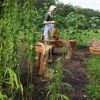 +22 +1
+22 +1Mt. Vernon starts growing hemp as tribute to Washington's original farming plans
Hemp was harvested on George Washington's historic estate, Mount Vernon, on Wednesday for the first time in centuries. By Aris Folley.
-
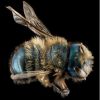 +20 +1
+20 +1A Promising Backup to the Honeybee Is Shut Down
The world’s largest almond grower has suddenly closed an eight-year research project to develop a new commercial pollinator. By Paige Embry.
-
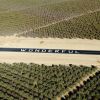 +11 +1
+11 +1A Kingdom from Dust
A story of power, drought, migrant labor, and an insatiable drive to expand. By Mark Arax, photographs by Trent Davis Bailey, illustrations by Denise Nestor.
-
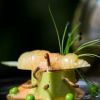 +15 +1
+15 +1Just not crickets
Proposals for developing more environmentally friendly food. By Bee Wilson.
-
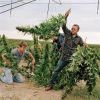 +22 +1
+22 +1Organic Weed? Marijuana Growers Go Green
An industry long haunted by negative connotations and a lack of sound research finds new opportunities in sustainability. By Austa Somvichian-Clausen.
-
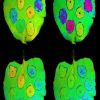 +19 +1
+19 +1Scientists tweak photosynthesis to boost crop yield
Researchers report in the journal Science that they can increase plant productivity by boosting levels of three proteins involved in photosynthesis. In field trials, the scientists saw increases of 14 percent to 20 percent in the productivity of their modified tobacco plants. The work confirms that photosynthesis can be made more efficient to increase plant yield, a hypothesis some in the scientific community once doubted was possible.
-
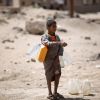 +15 +1
+15 +1We’re running out of water, and the world’s powers are very worried
Classified U.S. cables between American diplomats show a mounting concern by global political and business leaders that water shortages could spark unrest across the world, with dire consequences. By Nathan Halverson. (Apr. 11)
-
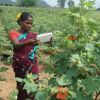 +30 +1
+30 +1How a simple SIM card makes farmers more efficient—and possibly saves lives
India's GreenSIM initiative exposes rural farmers to tech and essential real-time info. By Julianne Tveten.
-
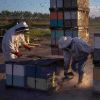 +37 +1
+37 +1Decline of Pollinators Poses Threat to World Food Supply, Report Says
Many pollinator species are facing extinction, including some 16 percent of vertebrates like birds and bats, according to the document. By John Schwartz.
-
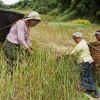 +35 +1
+35 +1This Ancient Grain May Have Helped Humans Become Farmers
Millet’s short growing season and low water needs might also benefit a modern world stressed by climate change. By Marissa Fessenden.
-
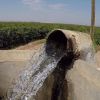 +20 +1
+20 +1Pumped Dry: The Global Crisis of Vanishing Groundwater
In places around the world, supplies of groundwater are rapidly vanishing. As aquifers decline and wells begin to go dry, people are being forced to confront a growing crisis.
-
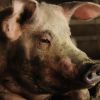 +13 +1
+13 +1Farmers urged to cut antibiotic use
Farmers need to dramatically cut the amount of antibiotics used in agriculture, because of the threat to human health, a report says. By James Gallagher.
-
 +14 +1
+14 +1Nature’s Critical Warning System
Scientists are homing in on a warning signal that arises in complex systems like ecological food webs, the brain and the Earth’s climate. Could it help prevent future catastrophes? By Natalie Wolchover.
-
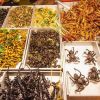 +21 +1
+21 +1Five Ways to Start Eating Insects
The idea may be hard to swallow, but crickets and mealworms will likely be part of our sustainable food future. By Emily Matchar.
-
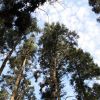 +17 +1
+17 +1More logging reported in monarch butterflies’ reserve
Monarch butterflies are arriving at their Michoacán and State of México sanctuaries, but they are under threat once again due to reports of illegal logging.
-
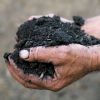 +17 +1
+17 +1Agricultural policy: Govern our soils
Luca Montanarella calls for a voluntary international agreement to protect the ground beneath our feet from erosion and degradation.
-
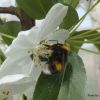 +22 +1
+22 +1New research reignites concerns that pesticides are harming bees
Bee colonies exposed to the pesticide seemed less active in pollinating apple trees. By Chelsea Harvey.
-
 +18 +1
+18 +1The great salmon compromise
The Columbia Basin Fish Accords have funded $1 billion worth of habitat restoration projects, but can they replace free-flowing rivers? By Ben Goldfarb. (December 2014)
-
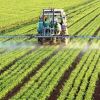 +23 +1
+23 +1Agri-Corporations Attempt to Hijack COP21
As we head into COP21, agri-corporations are attempting to hijack climate talks once again. Today we face two crises—climate change and species extinction. Our current modes of production and consumption are contributing to what climate change scientists term anthropogenic emissions—originating from human activity. If no action is taken... By Vandana Shiva.
-
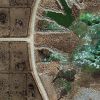 +25 +1
+25 +1The Human Stain
Photographer Mishka Henner stitches together public satellite images resulting in a big picture of whats happening at feedlots and oil fields.
Submit a link
Start a discussion




















